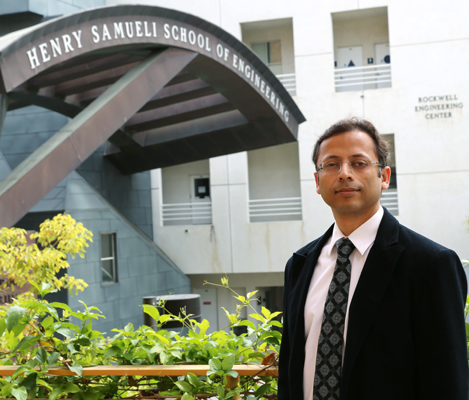 June 30, 2015 – Syed Ali Jafar, a Samueli School computer scientist who has changed the world’s understanding of the capacity of wireless networks, has won the 2015 Blavatnik National Award for Young Scientists in physical sciences & engineering. One of three winners chosen from among 300 candidates from highly ranked American universities and research institutions, Jafar will receive a $250,000 unrestricted cash prize and a medal in September at New York’s Museum of Natural History.
June 30, 2015 – Syed Ali Jafar, a Samueli School computer scientist who has changed the world’s understanding of the capacity of wireless networks, has won the 2015 Blavatnik National Award for Young Scientists in physical sciences & engineering. One of three winners chosen from among 300 candidates from highly ranked American universities and research institutions, Jafar will receive a $250,000 unrestricted cash prize and a medal in September at New York’s Museum of Natural History.
“I am incredibly honored and humbled to be recognized on the national stage – from such an amazing cohort of extremely accomplished finalists – by such an illustrious jury of the nation’s most distinguished scientists,” Jafar said. “I am deeply indebted to my brilliant students and collaborators, who are my true miracle workers. It is my hope that this recognition will lead to broader exposure to and appreciation of both the beauty of information theory and the tremendous impact it has on our lives. It’s also a ‘shot in the arm’ for me to continue taking on challenging problems in our research group.”
A professor of electrical engineering and computer science, Jafar explores the fundamental performance limits of wireless communication networks. Determining network capacity – the maximum data rates that can be reliably supported – is the holy grail of network information theory, according to Jafar and others. And with the rapid growth of wireless communication networks, the quest has taken on unprecedented urgency. Jafar’s research group has gained worldwide recognition for its numerous seminal contributions to this topic, including its groundbreaking work on interference alignment in wireless networks. This research found that data rates are not limited by the number of devices sharing the radio frequency spectrum, a discovery that changed the thinking about how wireless networks should be designed.
“Syed Jafar revolutionized our understanding of the capacity limits of wireless networks. He demonstrated that each user in a wireless network can access half the spectrum without interference from other users, regardless of how many are sharing the spectrum,” said one of the judges, Paul Horn, senior vice provost for research at New York University. “This is a truly remarkable result that has a tremendous impact on both information theory and the design of wireless networks.”
Jafar became interested in science in high school. “Einstein’s E=mc2 captured my imagination,” he said. The equation made him wonder about how something so profound could be so simple and beautiful – and it became his lifelong dream to pursue beauty through science. As a graduate student studying information theory at the California Institute of Technology, Jafar found similar elegance in the formula describing the capacity of an information channel. He realized that much about the capacity of communication networks was still unknown and made it his life’s work to solve the mystery.
The Blavatnik National Awards for Young Scientists program, established by the Blavatnik Family Foundation with the guidance of the New York Academy of Sciences, recognizes America’s most innovative and promising young faculty scientists and engineers. The organization’s judges include Nobel laureates, National Academy of Sciences members and National Medal of Science recipients. They select three laureates annually, one each in life sciences, chemistry, and physical sciences & engineering.
Jafar earned a B.Tech. at the Indian Institute of Technology in Delhi, an M.S. at Caltech and a Ph.D. at Stanford University, all in electrical engineering. He’s a fellow of the Institute of Electrical & Electronics Engineers, and he recently received the UCI Academic Senate’s Distinguished Mid-Career Faculty Award for Research. Jafar was also recognized as a Thomson Reuters Highly Cited Researcher and included by ScienceWatch among the World’s Most Influential Scientific Minds in 2014.
-- Brian Bell, UCI Strategic Communications; photo: Debbie Morales
